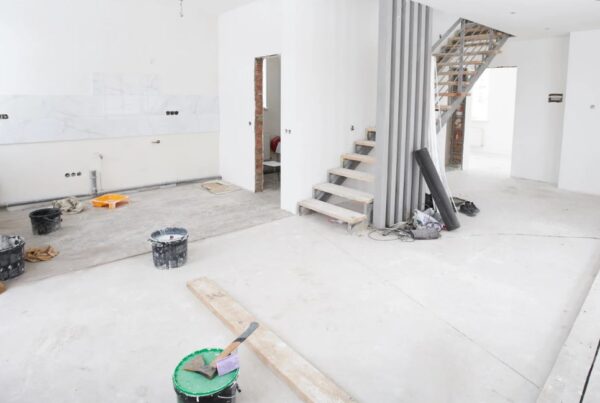Embarking on a home renovation project can be an exhilarating experience. It’s an opportunity to transform your living space into your dream home, reflecting your unique style and personality. However, as exciting as this process may be, it is fraught with potential pitfalls that can transform your dream into a costly nightmare. The key to a successful home renovation lies in choosing the right colours or materials, meticulous planning, and seeking professional assistance to avoid common mistakes that could lead to time-consuming and expensive corrections. This blog will guide you through the top mistakes to avoid during your home renovation. From understanding the importance of a realistic budget to recognizing the value of experienced contractors, we’ll provide you with essential insights to make informed decisions.
Failing to Plan and Prepare Properly
Underestimating the Budget
One of the most pervasive mistakes to avoid during your home renovation is underestimating the budget. Often, homeowners overlook unforeseen costs such as labour, materials, and contingencies, leading to stressful financial situations. To avoid this, get detailed quotes from several contractors to understand the market rates. Incorporate a contingency fund of around 10% of the total budget for unexpected expenses. Engaging a financial planner can also provide a realistic overview and help manage your finances effectively throughout the renovation process.
Skipping the Research Phase
Another critical step that is frequently overlooked is the research phase. Allocating time to research materials, design trends, and contractor reviews can save time and money in the long run. Understanding the durability and maintenance requirements of your chosen materials can prevent costly replacements in the future. Additionally, staying abreast of design trends ensures that your renovations stand the test of time, enhancing the long-term value of your investment. Thoroughly vetting contractors through reviews and past project assessments can safeguard against substandard quality.
Neglecting a Project Timeline
Creating a detailed project timeline is pivotal for a smooth renovation process. This timeline should include the start and completion dates and buffer periods to accommodate unexpected delays, which are not uncommon in renovation projects. Break down the project into phases, assign realistic timeframes to each, and communicate this with your contractors to ensure everyone is on the same page. Regularly reviewing and adjusting the timeline as work progresses can help manage any deviations from the plan, ensuring the project stays on track.
Overlooking Legal and Safety Requirements
Ignoring Building Codes and Permits
Bypassing building codes and neglecting to obtain the necessary permits is a mistake that can have significant legal and financial implications for homeowners. Building codes are established to ensure that all construction projects meet safety and quality standards, protecting the inhabitants and the public. Failure to comply can result in fines, legal action, and the requirement to redo work at your own expense. Acquiring permits involves submitting detailed project plans to local authorities for approval before work begins. However, it may seem like a hassle, securing the proper permits is crucial for avoiding legal complications and ensuring that your renovation meets all required safety standards.
Skimping on Safety Measures
The risks associated with neglecting safety protocols during home renovations are manifold, ranging from immediate physical injuries to long-term health issues from exposure to hazardous materials. Ensuring a safe construction environment requires adherence to practices like wearing personal protective equipment, securing work areas, and properly disposing of construction waste. Also, employing licensed contractors following occupational safety guidelines can help prevent accidents and injuries. Ignoring safety measures endangers the workers on site and can lead to costly medical bills or lawsuits if injuries occur on your property. Prioritizing safety is, therefore, not just a legal obligation but a moral and financial imperative.
Cutting Corners on Materials
Opting for cheaper, lower-quality materials during a home renovation may seem like a short-term cost-saving strategy, but it can lead to long-term disadvantages. Inferior materials often have a shorter lifespan, requiring more frequent repairs or replacements, which can ultimately exceed the initial savings. Additionally, they may not perform as well, potentially compromising your renovations’ functionality, efficiency, and overall aesthetic appeal. The use of subpar materials can also negatively impact the resale value of your home, as potential buyers are likely to notice and be turned off by the lower quality. Investing in higher-quality materials from the outset can save money, time, and frustration in the long run, ensuring that your renovated space remains beautiful and functional for years to come.
Mismanaging Project Scope
One of the most common mistakes to avoid during your home renovation is Scope creep. The gradual expansion of project objectives and deliverables without corresponding adjustments in resources, timeline, or budget, poses a significant risk to renovation projects. Managing project scope effectively requires clear initial goals, rigorous documentation, and regular communication among all parties involved. To combat scope creep, homeowners and contractors should agree on a detailed project scope before work begins, including specific materials, designs, and tasks to be completed. Regular project meetings can help identify and promptly address any inadvertent scope expansions. Employing a change management process, where any variations from the original plan are formally reviewed and approved, can also maintain control over the project scope, ensuring that any necessary changes are thoughtfully considered and budgeted for before implementation.
Inadequate Change Orders
Change orders are essential for documenting and formalizing project scope, timeline, or budget adjustments. They serve as a mutual agreement between homeowners and contractors on changes after the initial contract is signed. Inadequate or absent change orders lead to misunderstandings and disputes and could significantly impact project costs and completion dates. To avoid these issues, it’s imperative to establish a process for submitting, reviewing, and approving change orders that both parties can easily follow. Each change order should include a detailed description of the change, the reason for the change, and the impact on the overall project, including adjustments to the budget and timeline, as well as signatures from both the homeowner and the contractor. This process ensures that all changes are thoroughly vetted and agreed upon, preventing surprises and maintaining transparency throughout the renovation process.
Poor Communication and Documentation
Efficient communication and meticulous documentation play pivotal roles in the success of any home renovation project. A lapse in these areas can lead to discrepancies between homeowner expectations and contractor deliverables, resulting in dissatisfaction and potential disputes.
Not Keeping Accurate Records
Failing to maintain detailed and accurate records throughout the renovation process can lead to significant issues, both during and after the project. Here are some essential documents and records homeowners should keep:
- Project Contracts: Copies of the signed initial contract and any subsequent change orders.
- Receipts and Invoices: All materials purchased and services provided, including any deposits made.
- Warranties: All warranty information for materials, appliances, and labour.
- Permits and Inspections: Copies of all permits obtained for the work and records of inspections completed.
- Correspondence: Any email, text, or written communication between the homeowner and contractors, designers, or suppliers.
- Plans and Drawings: The final versions of any plans, drawings, or blueprints used during the project.
- Payment Records: Document all payments made, including dates and amounts, to contractors, subcontractors, and suppliers.
- Photographic Documentation: Before, during, and after photos of the renovation project to visually document the progress and quality of work.
Keeping these records organized and accessible can help homeowners manage the renovation process more effectively and resolve potential disputes or questions about the work performed.
Failing to Communicate Regularly with Contractors
Regular and clear communication with contractors is crucial for aligning project expectations, timelines, and changes. Establish a consistent communication schedule, whether through weekly meetings, daily updates, or as deemed necessary by the project scale. Utilize emails, phone calls, or project management apps to discuss progress, address concerns, and make decisions. Effective communication helps keep the project on track and builds a solid working relationship with your contractors, facilitating a smoother renovation experience. Remember, assumptions and guesswork have no place in renovation projects; clarity and confirmation are key.
Underestimating the Emotional and Physical Toll
Renovating your home is a financial investment and often a significant emotional and physical endeavor. Recognizing and preparing for the stress and strain it can inflict on your daily life is vital. Here, we cover how to manage these aspects effectively.
Stress Management During Renovations
The renovation process can be overwhelming, with decisions to be made and disruptions to daily routines. Setting realistic expectations about the project’s duration and potential inconveniences is crucial to managing stress. Developing a solid plan with buffer time for unexpected delays can reduce anxiety. Additionally, practicing self-care by maintaining a routine, including regular exercise, sufficient sleep, and healthy eating, can help you cope better with the stress. Establishing a clear communication channel with your contractor to stay informed about the project’s progress and being prepared for some uncertainty can also alleviate tension.
Living Arrangements During Major Renovations
Whether to live in your home during major renovations or to find temporary accommodation depends on the project’s scope, duration, and impact on your living spaces. For extensive renovations that affect key living areas like the kitchen or bathroom or require turning off utilities for extended periods, seeking alternative living arrangements may be more comfortable and less stressful. Staying elsewhere can also speed up the renovation process, as workers can proceed without cleaning up daily to make the area livable. However, if you choose to stay, create a temporary space that feels as normal as possible, and try to schedule work when it will cause the least disruption to your daily life.
Consult with Experts and General Contractors to Avoid Mistakes

Engaging with renovation experts and general contractors is a critical step in ensuring the success of your home renovation project. Their expertise not only brings your vision to life but also offers several distinct advantages, including:
- Professional Insight and Experience: Experts can provide valuable advice on design, materials, and functionality, ensuring that the finished project meets your expectations and needs.
- Cost Efficiency: Experienced contractors can more accurately estimate costs and suggest budget-friendly alternatives without compromising quality.
- Time-Saving: Professionals are adept at managing schedules, obtaining permits, coordinating with suppliers and subcontractors, and streamlining the renovation process.
- Quality Assurance: Hiring a reputable contractor means access to skilled craftsmanship and a higher standard of work, resulting in a durable and aesthetically pleasing renovation.
- Problem-Solving: Experts can foresee potential issues and address unexpected problems as they arise, minimizing disruptions to the project.
- Regulatory Knowledge: General contractors are knowledgeable about local building codes and regulations, ensuring your project complies with all legal requirements.
- Stress Reduction: By handling the complexities of the renovation project, professionals alleviate the stress and burden from homeowners, making for a smoother renovation experience.
Relying on the expertise of seasoned professionals can significantly improve the success and satisfaction of your home renovation project.
Conclusion
Navigating the complexities of a home renovation project requires thorough planning, continuous communication, and an understanding of the impact it will have on your daily life. Understanding the most common mistakes to avoid during your home renovation is paramount. By maintaining meticulous records, engaging in consistent dialogue with your contractors, and preparing for the emotional and physical toll, you can minimize the common pitfalls many homeowners face. Consulting with renovation experts and general contractors brings professional experience and insight. It ensures that your project adheres to a high standard of quality and compliance with local regulations. Prioritizing quality, professionalism, and a strategic approach to project management will safeguard your financial investment and enhance the enjoyment and value of your renovated home. Take these lessons to heart to ensure your renovation project is as stress-free and successful as possible.
Are you ready to start your home renovation project with SelectPDL? Take the first step by scheduling a no-obligation consultation. You can reach us at 587-385-8925 or contact us using our form. Let’s work together to transform your space!




